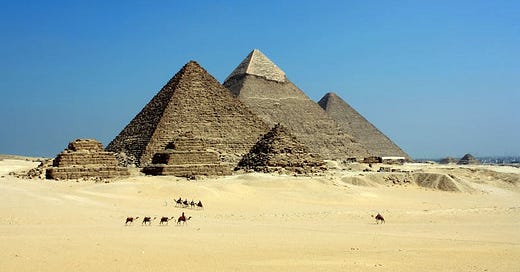It’s been awhile since I’ve done a Hebrews post. My wife Laura went on winter break from school, so I’ve spent the last three weeks hanging out with her and the kids while doing a little Christmas shopping, visiting family, and generally mucking about. We’ve also watched a lot of Peppa Pig and Bluey.
Anyway, I had planned on doing a part 2 to my Hebrews 10 article as well as a part 3 to my baptism article, but I’ve decided they are fine where they are. To be totally honest, the holiday break took away my momentum on those subjects, so I need to just admit defeat, move on to the rest of Hebrews, and get on to bigger and better things.
If you want more information on either of those subjects, reach out to me and I would love to dialogue with you through email, Facebook messages, or even Zoom.
Okay, that’s enough housekeeping. Let’s get on with Hebrews 11. As usual, all quotations come from Scot McKnight’s The Second Testament unless otherwise noted.
Moses and the Suffering of Christ
In allegiance Mōüsēs, becoming great, denied being spoken of as “Pharaō’s daughter’s son,” rather, choosing to be co-treated-badly with God’s people than to have a pleasure season of sin, considering Christos-degradations greater wealth than Aiguptos’s [Egypt’s] treasures, for he was looking out for the payback. Hebrews 11:24–26
And now from the NRSV.
By faith Moses, when he was grown up, refused to be called a son of Pharaoh’s daughter, choosing rather to share ill-treatment with the people of God than to enjoy the fleeting pleasures of sin. He considered abuse suffered for the Christ to be greater wealth than the treasures of Egypt, for he was looking ahead to the reward. Hebrews 11:24–26
In Hebrews 11, faith is defined as “the reality of things hoped for, the conviction in matters not seen” (Hebrews 11:1). Though Moses had never seen the Christ, he knew there was something to co-suffering with the people of God. Like Jesus, he chose to suffer and possibly die if it meant redeeming his people.
Having given up the comforts and status of Pharaohs daughter’s adopted son, Moses chose instead to “go outside the camp” because he knew that God had something better planned for him. What could be compared to the riches of the greatest empire on earth at the time?
From an outsider’s perspective, Moses got the short end of the stick. He had to wander around in a wilderness for forty years while babysitting a people who were constantly complaining and questioning his calling. That doesn’t sound that great.
But to Moses, he may have been frustrated several times, but his frustration was nothing compared to the vision he had of the promised land of salvation of redemption. He saw the Lord’s Christ and knew any amount of suffering would be worth it all—even if he would never enter the earthly promised land himself.
Through the lens of the cross, earthly wisdom is no longer wisdom. It becomes foolishness. And to Moses, the foolishness of the riches and power of the Egyptians was nothing compared to the wisdom and glory of God.
He talked with God. He saw God. He constructed a tabernacle for the Divine. He lead the people to the promised land. He cultivated a leader to take his place. He gave Israel the Law.
Was the suffering worth it? I’d say so, and I think Moses would too.
All these, being witnessed through allegiance, did not receive the pledge … God foreseeing something better for us … so without us they would not be completed. Hebrews 11:39–40




